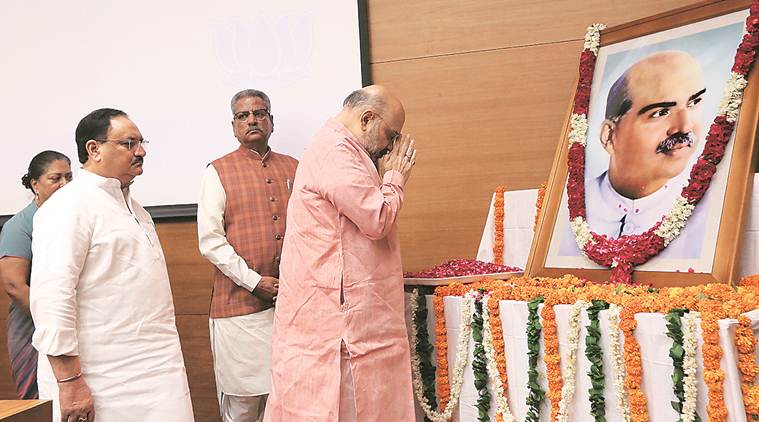
BJP working president J P Nadda on Sunday said Jana Sangh founder Syama Prasad Mookerjee had died under mysterious circumstances but history is witness to the fact that then Prime Minister Jawaharlal Nehru did not order a probe despite demands for inquiry by his mother and people across the country.
Addressing BJP workers after paying tributes to Mookerjee on his 66th death anniversary, Nadda said that Mookerjee’s sacrifice will not go in vain, and that the BJP is committed to fulfilling his vision.
Paying tributes to Mookerjee at the BJP headquarters, BJP president Amit Shah said that it is due to Mookerjee’s sacrifice that people from other states can today travel to Jammu and Kashmir without permit, and that West Bengal is an integral part of India.
READ | People travel to J-K without permit due to Syama Prasad Mookerjee’s sacrifice: Amit Shah
The BJP organised events in different cities to pay tributes to Mookerjee, who was the first Union Industries minister.
Speaking in Bengaluru, former Karnataka chief minister and BJP state president B S Yeddyurappa also charged the Congress with not investigating the “mysterious” death of Mookerjee, PTI reported. “He (Mookerjee) died under mysterious circumstances. The Congress government under Jawarhalal Nehru did not do any investigation. Nehru did not respond to the letter by Mookerjee’s mother to probe her son’s death.”
The BJP leader alleged that Nehru “victimised” Mookerjee —like he did to the architect of Constitution Dr B R Ambedkar and the country’s first Home Minister Vallabhbhai Patel.
Union minister and Lok Sabha MP from Udhampur Jitendra Singh, alleged that former Jammu and Kashmir CM Sheikh Abdullah had illegally detained Mookerjee for 44 days in a jail in the state in 1953, reported PTI.
Mookerjee had died in police custody in Srinagar in 1953 after he had entered J&K, defying requirement for obtaining a permit. The then government had said he had died due to medical reasons after his health conditions deteriorated in custody. The Jana Sangh had suspected foul play and sought a probe.
At the BJP headquarters in Delhi, Nadda said that Mookerjee had resigned from the Union Cabinet to protest against Nehru’s appeasement policy, and the “Nehru-Liaquat Ali pact’.
The 1950 agreement between Nehru and his Pakistan counterpart, Liaquat Ali, was to safeguard the rights of minorities in both countries.
Nadda said that when Mookerjee died under mysterious circumstances, questions were raised across the country about his death, given that the Jana Sangh leader was completely healthy while entering Jammu a month before that.
“Mookerjee made a sacrifice. His sacrifice will never go in vain, and the BJP is committed to that,” Nadda said.
Nadda also said that Mookerjee brought Jammu and Kashmir into the country’s mainstream. “We are taking this agenda (bringing J&K to the mainstream) forward under the leadership of Prime Minister Narendra Modi. The party has moved ahead with complete strength on the issue of Jammu and Kashmir,” he said.
According to Jitendra Singh, when Nehru and then Union Home minister K N Katju arrived in Srinagar as Sheikh Abdullah’s guests on the May 24, 1953, none of the three bothered to inquire about Mookerjee, who was lodged in a jail just a few kilometers away. Even when Mookerjee died “under mysterious circumstances” at 3.40 am on June 23, 1953, the news of his death was held back for several hours and was broadcast on All India Radio only at 12.50 pm, Singh maintained.